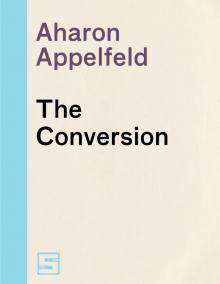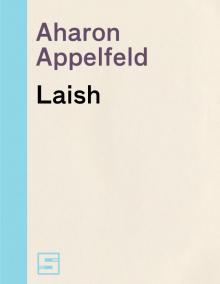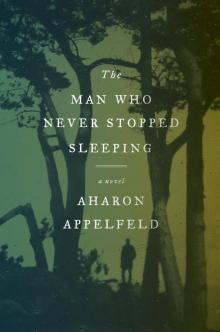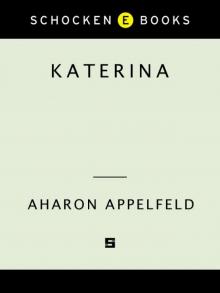- Home
- Aharon Appelfeld
The Conversion
The Conversion Read online
BOOKS BY AHARON APPELFELD
Badenheim 1939
The Age of Wonders
Tzili: The Story of a Life
The Retreat
To the Land of the Cattails
The Immortal Bartfuss
For Every Sin
The Healer
Katerina
Unto the Soul
Beyond Despair:
Three Lectures and a Conversation with Philip Roth
The Iron Tracks
Translation copyright © 1998 by Aharon Appelfeld
All rights reserved under International and Pan-American Copyright Conventions. Published in the United States by Schocken Books Inc., New York, and simultaneously in Canada by Random House of Canada Limited, Toronto. Distributed by Pantheon Books, a division of Random House, Inc., New York.
SCHOCKEN and colophon are trademarks of Random House, Inc.
Originally published in Israel as Timyon by Keter Publishing House Ltd., Jerusalem, in 1993. Copyright © 1993 by Aharon Appelfeld and Keter Publishing House Ltd. This translation was originally published in hardcover by Schocken Books Inc., New York, in 1998.
Library of Congress Cataloging-in-Publication Data
Appelfeld, Aharon.
[Timyon. English]
The conversion / Aharon Appelfeld; translated from the Hebrew by Jeffrey M. Green,
p. cm.
ISBN 0-8052-1098-9
I. Green, Yaacov Jeffrey. II. Title.
PJ5054.A755T5613 1998
892.4′36—dc21 98-18169
CIP
Ebook ISBN 9780805243468
Random House Web Address:
www.randomhouse.com
v4.1
a
Contents
Cover
Books by Aharon Appelfeld
Title Page
Copyright
Chapter 1
Chapter 2
Chapter 3
Chapter 4
Chapter 5
Chapter 6
Chapter 7
Chapter 8
Chapter 9
Chapter 10
Chapter 11
Chapter 12
Chapter 13
Chapter 14
Chapter 15
Chapter 16
Chapter 17
Chapter 18
Chapter 19
Chapter 20
Chapter 21
Chapter 22
Chapter 23
Chapter 24
Chapter 25
Chapter 26
Chapter 27
Chapter 28
Chapter 29
Chapter 30
Chapter 31
About the Author
CHAPTER
1
The ceremony was short, subdued, and without ostentation. Only afterward, in the church’s reception room, did the voices return to normal. Wine, homemade pastries, and sweets were served. Schmidt, the lawyer, hugged Karl warmly, as if a business deal and not a solemn ceremony had at last been concluded. The touch of the lawyer’s hand once again brought school before Karl’s eyes, the graduation parties and his Aunt Franzi’s bright face, an entire life that now flowed into the abyss with a deafening roar.
Karl checked his emotions and shook the guests’ hands with a smile. The more faces that passed before him, the clearer it became: there was no going back.
He had known most of them as classmates. Now in their thirties, some of the men were bald, and the women had become grim little housewives. Only yesterday these faces had been open and alive. Now the years had sealed them up. For a moment he forgot the ceremony, and the memories that passed filled him with gloom. That lasted only a moment. The hands that were extended to him from all sides were familiar. A few secret enemies, perhaps, but he knew that if he were ever in trouble he could depend on most of them.
Several guests surrounded Father Merser and congratulated him too. Father Merser seemed to tower above everyone, perhaps because he was still wearing his long priestly garb. His sister, Miss Clara, gaily offered cream puffs. Everyone knew her too. She was a pretty woman, around forty. She had been the cause of a few scandals that had been resolved with her brother’s help. Father Merser was fond of her and would bring her to ceremonies like this one, to demonstrate that she had reformed.
On the other side of the room cognac and liqueurs were being served. A tall man stood in the center, Slavic-sounding words rolling off his tongue. With his long arms he made some elaborate gesture, and everyone around him erupted in laughter. Karl remembered him too, but couldn’t recall his name.
The spell of the ceremony gradually faded, and everyone grew hungry. A ceremony like this is no more than a tonsillectomy one of his childhood friends had told him. But Karl now felt differently: as if his legs were weighed down.
In the corner stood a woman, not young, dressed in old-fashioned clothes. It was Aunt Franzi’s friend. She too had dreamt of a career in the theater. She had studied in Russia, with Stanislavsky, for several years. Upon her return she had married an impoverished nobleman and settled on the outskirts of town. Aunt Franzi was very close to her and would describe her as “a great woman who was crushed by the provinces like a fly.” Karl crossed the room and hugged her gently.
“We all end up here,” she said with a good-natured smile.
“So it seems.”
“I did it while my parents were living, and I regret it to this day. Things like this should be done secretly, under the cover of night, don’t you think?”
“How did you hear about it?”
“The church bells, my friend, didn’t they ring? I don’t live far from here. I see and hear everything.”
“Lovely.”
“How is Aunt Franzi?”
“I haven’t seen her in years.”
“We’re criminals,” she leaned over and whispered. “Those who are dearest to us we neglect. In the world to come, they’ll whip us like dogs.”
Father Merser circulated among the guests, most of whom he knew well. He had even married some of them. Though pleasant enough, he was not well liked. “No one easily forgets the one who converts him,” Karl’s friend Erwin had once said in a moment of insight.
Afterward, Karl spoke passionately of the need to institute certain municipal laws to decrease friction between citizens and the authorities. His words didn’t suit the event. They sounded as if written for a different audience, but no one objected. Everyone was caught up in the celebration, which rushed along with a gay murmur.
Martin Schmidt, the lawyer, approached Karl again. “Everything went very nicely.”
“It was simpler than I had imagined it.”
“Father Merser is a very pleasant man.”
“True.”
“And very tactful,” added Martin.
“So it seems.”
Martin Schmidt had converted more than ten years before, with his parents’ permission, and since then he had attended every conversion in the city. This time there was an additional reason: he and Karl had been close friends since childhood. Martin’s early conversion had put a crimp in that long friendship, but now it was as if the two were brothers again.
“See you later,” said Martin.
“Sure.”
One after another, the guests came and shook his hand. He hadn’t expected the transition to be like this. The pain was so subtle he could barely feel it. If anything of the ceremony stuck in his mind, it was Father Merser’s sturdy fingers gripping the brass vessels on the altar.
Quite a few people had converted in recent years. Some with their parents’ blessing, but most on their own. They were the young and not so young, and even a few old men. Five years ago a resident of the old age home had converte
d, a fellow of about ninety. For years he had threatened that if they didn’t improve the heating, he would go to the Catholic old folks’ home. People made fun of him. They didn’t believe him. In the end, he carried out his threat, and Father Merser presided over the ceremony, with his customary grace.
The conversations in the reception room ebbed and flowed. People were talking about city affairs, the district, transportation, and the fate of the empire. Karl went from group to group, telling a joke or simply nodding his head.
“Permit me to congratulate you,” said Hochhut the industrialist, extending the cold hand at the end of his short, stubby arm. In gymnasium Hochhut had been two classes ahead. Karl had never been fond of him. The man always made him nervous. In school Hochhut had not been much of a student, but ambition had accomplished what his brain couldn’t. In fact, he had achieved the impossible, establishing a string of factories along the Danube. As if to spite everyone, he lived not in the capital, but in his native town, surrounded by friends and enemies.
The reception was supposed to last about an hour, but it went on. In one corner people spoke energetically about the need for change in the city. Everybody knew this meant pulling down the old Jewish shops in the center of town, but no one said it in so many words. More than once in recent years the municipality had been about to condemn the district, but the merchants outsmarted the authorities, putting money in the right hands, and the plan was never carried out. Karl caught the drift of the conversation. He was familiar with the issues. His parents had owned a shop in the old market. Unprofitable, it had burdened them like a humped back. Finally, they sold it for next to nothing, to a Jewish merchant, who turned the dank cave into a thriving business.
“We’re talking about the center of town.”
“I understand,” said Karl.
“Its former glory must be restored.”
“Correct.”
“The center must be elegant.”
“Absolutely.”
Since leaving school, Karl had worked for the municipality. His parents had wanted to send him to the university in Vienna, but in the end they simply couldn’t afford to. Karl tried for a scholarship several times but failed. Without a scholarship, he had no choice but to remain in his parents’ house. For a few years he worked as a trainee, and afterward he began making his way up the hierarchy. Now he had his eye on the high office of municipal secretary.
“I wish to congratulate you,” said the doctor. Karl knew him well. He was a shy man, full of inhibitions, for whom school was a constant struggle. Had it not been for his parents’ ambition and private tutors, he would never have graduated. So it was in medical school too. His parents worked night and day in their little shop, helping him and urging him on, but they didn’t live to see him sit in his office. They had both passed away before he graduated. Karl didn’t like him. For years he had avoided him. Now the doctor was standing before him, face to face. The same old Freddy, the same stooped posture, the same pallor. Neither medical school nor conversion had changed a single feature of his appearance. Karl marveled at the constancy.
“How are you, Freddy?”
“All is well. This is my wife.”
Karl had never met her before. She was taller than Freddy, and thin. Traces of the peasant remained in her face, but in her expression one saw a strange blend of cunning and smugness, all because of her husband’s clinic.
“You look excellent,” Freddy told him.
“Same as ever,” said Karl, taking a step backward.
“We would be pleased to see you in our home,” said the wife.
“Delighted.”
Karl knew women like this very well. While still at the gymnasium, they decided they would get a Jewish husband, no matter what. Afterward, they would mold him however they wished. Now Karl noticed that something of Freddy’s wife had rubbed off onto Freddy’s face. To the blush of shame was added the flush of beer.
The president of the church’s lay association stood against the wall, along with his assistant, glasses in hand, listening to the various conversations without mixing in. Father Merser greeted them, and they spoke about mundane affairs—lighting in the church, renovations, and the treasury, which was empty once again. Father Merser promised that in his next sermon he would not forget to remind the faithful of their duty.
Thus the reception ended. The president and his assistant left first. Then Karl’s colleagues shook his hand. Freddy and his wife also approached. Martin stood to the side, waiting for the moment when he could snatch away his friend. Father Merser hugged Karl again in a fatherly way. It was clear that the tall, distinguished man was not only fond of him, but also respected him. “We shall see each other soon,” Father Merser said, looking like someone who has brought a ship safely to harbor.
“Let’s go,” Martin called in a youthful voice, as soon as the hall was empty.
“Where to?”
“For a bite.”
This could mean only one place: Big Victoria’s. During their last two years of school, he and Karl went there often. At one time it had been a shabby roadside inn, where Big Victoria herself saw to everyone’s needs. She was hostess, waitress, and whore combined. In their senior year she already had a helper, a girl who assisted her in all her roles. Later, Victoria fell ill and had to step aside, but she continued to keep an eye on the customers. Over the years the place had changed. Outwardly it looked respectable enough, but people knew you could find a girl in every room on the top floor.
“Just a minute,” said Karl.
“What are you looking for?”
“My coat.”
“It must be hanging in the coat room.”
Karl opened the partition, and before his eyes the nave of the church was revealed to him in all its splendor. Candlelight and the glow of the setting sun mingled with marvelous intensity.
“Where to?” asked Karl, absentmindedly, his coat in hand.
“To restore former days,” said Martin, grabbing his arm.
The two went out into the air. They were friends for any number of reasons. First of all, their parents had been friends. And then, they were in the same class and had done well in the same subjects. And they had always enjoyed each other’s company. True, Martin’s parents were wealthier and had sent him to study law. But Martin’s position and status didn’t affect their long friendship. Yet, when Martin converted, Karl felt a distance open up between them. Nevertheless, they continued to meet from time to time. Martin did well in his practice, opening up offices in nearby Celan and Schwarzhof. Meanwhile, Karl slowly made his way through the maze of the municipal bureaucracy.
They crossed the park in the direction of the meadows and hurried along the dirt path, as they used to on their way home from school. When they reached the river, Karl spoke of his wish to sell his parents’ house and buy an apartment. Martin listened intently, without interrupting.
Victoria greeted them warmly. She knew all the graduates and kept track of them. Quite a few had spent time in her broad bed. Since her illness, she no longer took them to bed, but everybody still came by for a drink now and then, or for an evening’s diversion.
“It’s good to see old friends together,” she began.
“And how are you?” Martin allowed himself to address her familiarly.
“Out of the current, up on the bank.” That was one of the sayings she had adopted in the past few years.
“And how is it up there?”
“Don’t ask.”
“Give us just a hint.”
“Dismal, dismal. Now I’ll find you a nice, quiet place, near the window. Friendship from childhood is harder than the love of women.”
She knew what had happened in church that day, but she was too polite to pry. She had never been the least bit devoted to the church. Indeed, she thought the world would be better off without it. She did, however, have a certain affection for the Jews, though it was not unequivocal, and occasionally one could hear her say, “Yes, the Jews are mo
re refined.” Perhaps there was a hint of sarcasm in that compliment, but that night, in any event, her heart was not bitter. She stepped out of her booth, showed them to a quiet corner, and left them to themselves.
“I’m glad it’s all over and done with,” Karl said vaguely.
“Father Merser was very tactful,” Martin said.
“It seemed so to me.”
Karl had two glasses of cognac and immediately felt better. The sandwiches were the kind they had always served here, and he was glad to see the familiar slices of bread, as if he had returned home after a long trip.
“I love these sandwiches. They put me in a good mood,” said Martin, chuckling, as he arched his back and grasped his knees.
It was after gymnasium had ended that Victoria fell ill and changed. She would send her young customers upstairs with a scowl. As if they were trying to sneak in. When she wasn’t feeling well, she would grab a boy, pinch his behind, and warn him: “Don’t act like a savage.”
No one could forget that place. The first customers keep returning, sometimes with their wives, to remember the days when they, and the world, had been young.
“I haven’t been here for a long time,” said Karl.
“Neither have I.”
“The elegance here is pointless. A whorehouse should look like a whorehouse, not a tea room.”
“She did it to improve business.” Martin tried to defend her.
They were glad to be together. The distant years returned to them with each drink. School days were not always so splendid, but it had been an intense and exhilarating time. Both boys had done excellently in mathematics and Latin. The Latin teacher, a bitter anti-Semite, would sometimes say, “Karl and Martin have brilliant minds, like all the members of their race. If only the Jews were honest, they would be a blessing to the world.” The mathematics teacher, Andreas, was wittier, and it was hard to be angry at him. He would say, “Karl and Martin have Talmudic minds, though I doubt they know even a word of Hebrew.”
“Yet you’ve been successful.” The words popped out of Karl’s mouth.
“Me?”
“You’ve succeeded in opening a couple of branch offices.”
“Don’t be envious of me.”

 Long Summer Nights
Long Summer Nights Tzili
Tzili The Conversion
The Conversion The Iron Tracks
The Iron Tracks All Whom I Have Loved
All Whom I Have Loved Laish
Laish The Retreat
The Retreat Unto the Soul
Unto the Soul Blooms of Darkness
Blooms of Darkness The Man Who Never Stopped Sleeping
The Man Who Never Stopped Sleeping Katerina
Katerina Until the Dawn's Light
Until the Dawn's Light Adam and Thomas
Adam and Thomas Suddenly, Love
Suddenly, Love